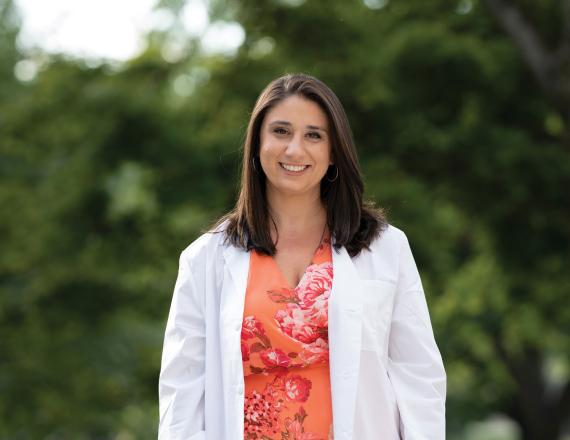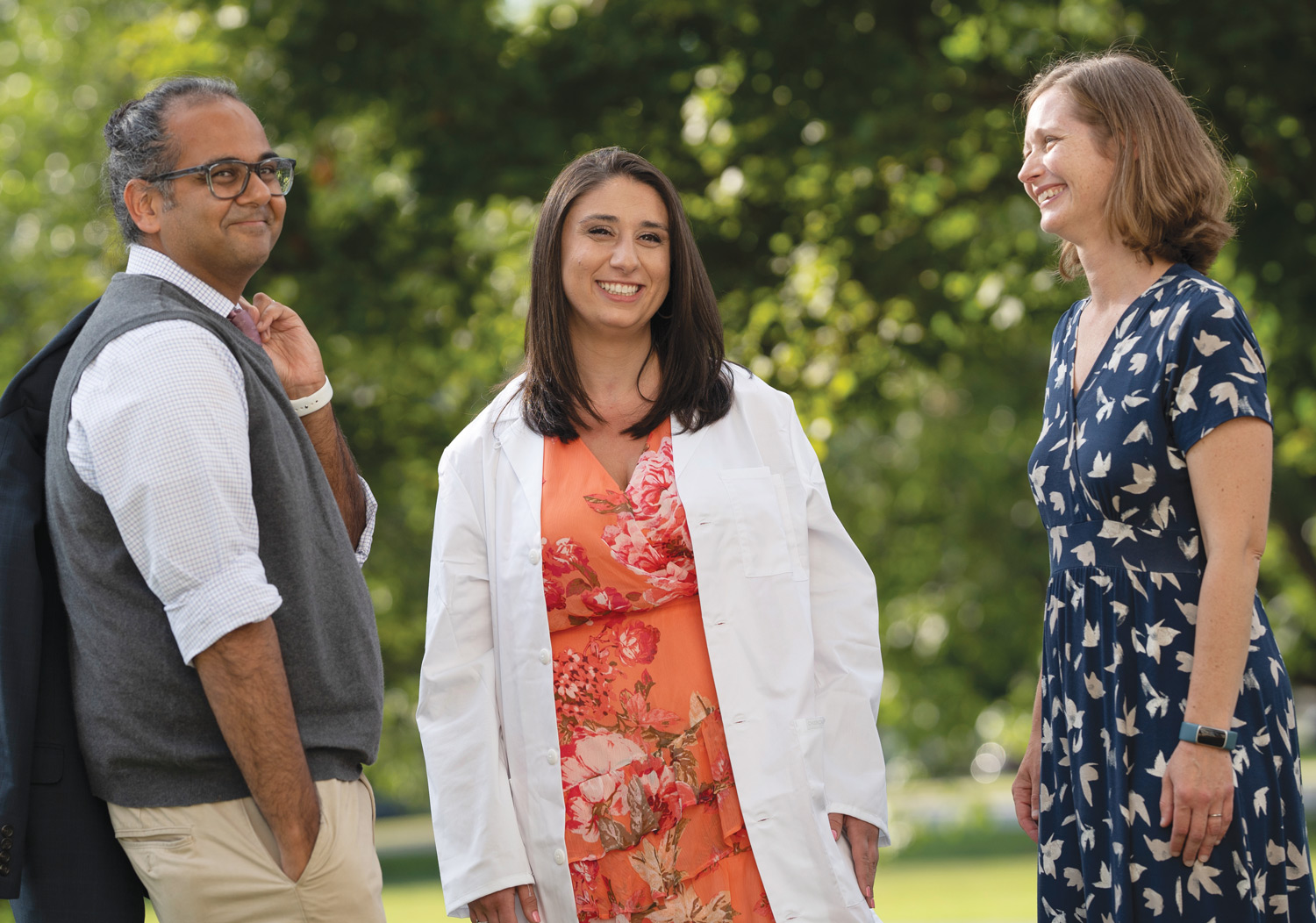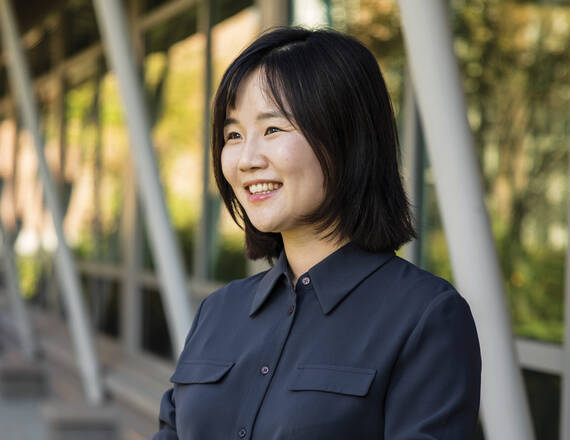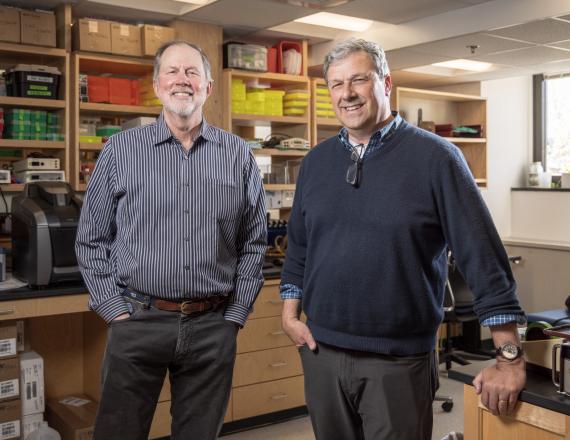Putting the heart back in healthcare
Jaclyn Engel D’19, MED’26 was pretty sure she wanted to be a doctor—she’d been saying so since fifth grade—but approaching her final year at Dartmouth College, she had some reservations. As a first-generation college student without any family connections to medicine, Engel found the career path daunting. She also wondered: Could she be the doctor she dreamed of being, one who established meaningful relationships with her patients, in today’s healthcare landscape?

“The journey to medicine was foreign territory for me,” says Engel. “I needed to draw from outside sources.”
A psychology major, she found a program to augment her pre-health studies the summer between her junior and senior years, when she participated in the inaugural sessions of Dartmouth Health Care Foundations (DHCF). Established through a visionary gift from Dartmouth College alumnus Eric Eichler D’57, DHCF introduces undergraduates interested in healthcare careers to the fundamental connections between the humanities and medicine. As patient loads, time constraints, and workplace bureaucracy continue to exacerbate an epidemic of physician burnout, DHCF was designed to help future industry leaders put the heart back in healthcare.
“All my doubts were erased when I attended DHCF,” Engel says. “I wanted to be a doctor, and I wanted to train at Dartmouth.”
A revolutionary approach to pre-health education
DHCF is sponsored by The Dartmouth Institute for Health Policy and Clinical Practice and led by Manish Mishra MED’05, MPH’09, the director of professional education at The Dartmouth Institute and the director of the Learning Environment Office at the Geisel School of Medicine, and Elizabeth Carpenter-Song, PhD, D’01, a research associate professor of anthropology at Dartmouth. Through a suite of programs, DHCF brings together clinicians and musicians, global health leaders and rural health experts, artists, athletes, and academics. The programs offer a revolutionary, interdisciplinary approach to pre-health education that fosters compassion, creativity, and resilience—crucial skills and attributes for the next generation of healthcare leaders.
Engel describes the summer intensive in 2018 as “a very powerful experience.” Listening to Glyn Elwyn, MD, PhD, a professor of The Dartmouth Institute, talk about engaging patients in shared decision making, Engel recognized “the kind of doctor I want to be, who partners with patients to make decisions together.” She also was moved by Will Cheng, PhD, associate professor of music at Dartmouth, who drew comparisons between celebrated musicians and physicians, both of whom benefit from humility and self-reflection. Each day ended with students and program leaders gathering together at fireside chats to discuss the day’s learnings.
“I loved Dartmouth, but I always expected to have a pivotal college experience that, by my junior year, hadn’t happened yet,” Engel says. “After one of the DHCF fireside chats I was standing beneath the starry sky and I knew, this is my moment—this is why I’m here.”
Following the summer session, Engel was selected to join the first cohort in the Eric Eichler ’57 Fellowship for Health Care Leaders. As a fellow, Engel engaged in a service project at a long-term care facility, spending time with a woman who had dementia.
“I listened to her story and learned how to communicate and connect with someone who’s at such a vulnerable point in her life,” Engel says. She met regularly with her fellowship mentor, the Preston T. and Virginia R. Kelsey Distinguished Chair in Cancer and Dartmouth Cancer Center Director Steven Leach, MD, to talk about her volunteering experience and lessons gleaned from it. Mishra and Carpenter-Song, too, held regular office hours to mentor fellows in applying concepts and methods from the humanities to their future work of caring for patients, supporting the health of populations, and promoting well-being for healthcare providers.
The fellows also spent time at Dartmouth’s Hood Museum of Art. “We learned how to really take in art, how to think about what a painter intended by using particular colors or brushstrokes,” says Engel. “Then we related that to paying close attention to a patient, to considering the different cultural and social factors that go into someone’s health.
“In the culture of medicine efficiency is key,” she continues, “but if you’re so focused on being efficient and don’t take time to slow down and absorb what’s in front of you, you can miss a lot.”

Lifelong mentors and a supportive community
After graduating from Dartmouth College, Engel remained on campus to conduct research with Glyn Elwyn, who so inspired her at the DHCF summer session, and with Amber Barnato, MD, MPH, MS, the John E. Wennberg Distinguished Professor and the director of The Dartmouth Institute. With Elwyn, she helped design decision-making aids for people with low health literacy, gaining valuable firsthand experience speaking with and advocating for patients. Barnato’s team was developing a video game for providers to encourage advance care planning conversations, and Engel assisted in testing and disseminating it. She co-authored numerous published papers about these and other studies.
This summer, Engel was welcomed to Geisel with 91 other new MD students, realizing her dream to further her medical education at Dartmouth.
“Geisel embraces the same core values championed by DHCF, which played a big part in my decision to continue my training here,” she says. “Plus I feel part of such a great, supportive community. I just love being here!”
That supportive community includes her DHCF mentors, with whom she’s formed lasting connections. “They emphasized from the beginning that they are here for us for as long as we need them and it’s true—they’re the people I call when I need career or life advice. They’ve been absolute pillars.”
And though donors like Eric Eichler may not have a regular presence on campus, Engel is grateful that they’re part of the community, too. Philanthropy funds the scholarships that are enabling Engel to thrive at Geisel; and it’s the backbone of life-changing programs like DHCF.
“I’m not ready to say for sure what specialty I’ll be going into, but having scholarship support gives me the flexibility to consider primary care, which seems like a good fit for me,” Engel says. “Thanks to DHCF and its humanistic approach to healthcare, I know how I want to practice medicine, and who I want to be as a doctor—no matter what career path I follow.”

